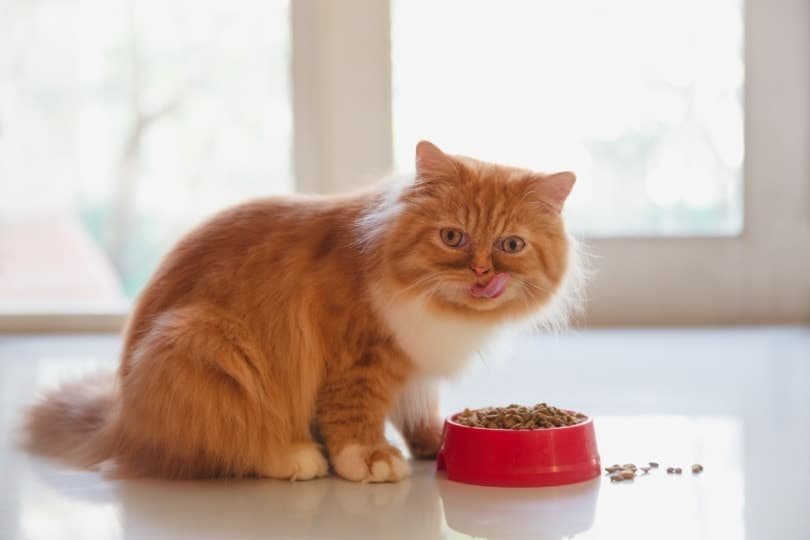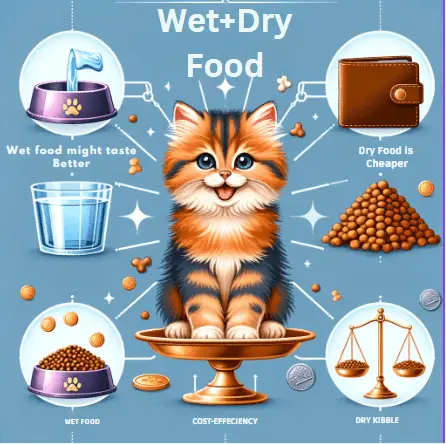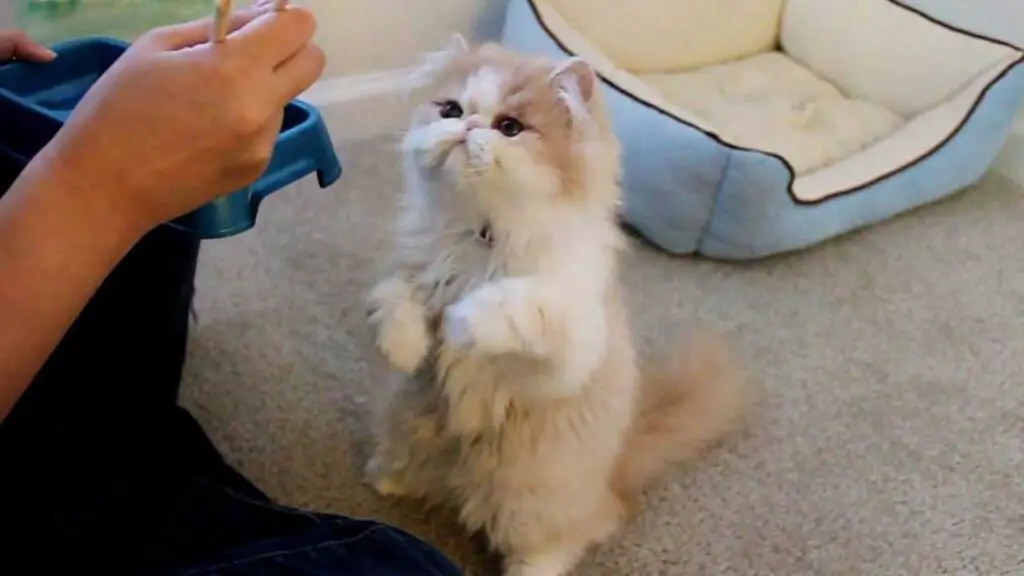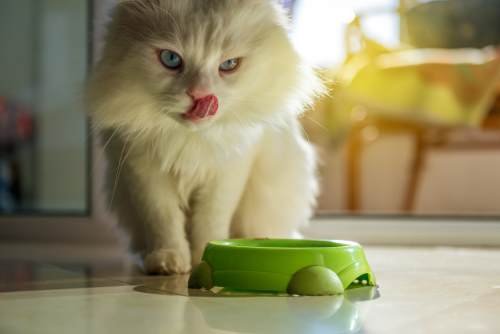So you’ve just brought home a beautiful Persian cat and you want to make sure you provide them with the best possible nutrition. Well, fret not, because in this article, we’ll explore everything you need to know about what to feed your Persian cat. From their unique dietary requirements to the importance of a balanced diet, we’ll delve into the world of feline nutrition and provide you with insightful tips and recommendations. Whether you’re a seasoned cat owner or a first-time Persian cat parent, get ready to discover the key ingredients to keeping your furry friend healthy, happy, and purring with delight.
Basic Diet
High-quality commercial cat food
When it comes to feeding your Persian cat, it is essential to provide them with high-quality commercial cat food specially formulated for their nutritional needs. Look for cat food brands that prioritize protein sources, such as meat, poultry, or fish, as the primary ingredient. These foods are usually balanced and provide the necessary vitamins and minerals that your Persian cat requires for optimal health.
Canned or wet food
Incorporating canned or wet food into your Persian cat’s diet is highly beneficial. Wet food not only adds hydration to their diet but also helps prevent urinary tract problems. Additionally, the smooth texture of wet food is easier for Persian cats, who may be prone to dental issues, to chew and digest.
Raw or homemade food
Some cat owners choose to feed their Persian cats a raw or homemade diet. This can be a viable option, but it requires careful planning and consultation with a veterinarian to ensure that your cat receives all the necessary nutrients. Raw or homemade food should include a variety of high-quality meats and organs, ensuring that your Persian cat gets a balanced diet.
Meat and Protein
Chicken
Chicken is an excellent source of lean protein for your Persian cat. It is easily digestible and provides essential amino acids that contribute to muscle growth and maintenance. Make sure the chicken is boneless and cooked thoroughly to avoid any potential health hazards.
This image is property of qph.cf2.quoracdn.net.
Turkey
Turkey is another protein-rich option for your Persian cat. Like chicken, it contains important nutrients and is beneficial for their overall health. Cooked turkey can be a delicious treat for your feline friend, but it’s crucial to remove the bones before feeding.
Beef
Beef can be a valuable source of protein and important nutrients for your Persian cat. Ensure that the beef is lean and cooked thoroughly to eliminate any risk of bacterial contamination. However, it’s worth noting that excessive consumption of beef may lead to weight gain or digestive issues, so moderation is key.
Fish
Fish can be a great addition to your Persian cat’s diet, as it provides omega-3 fatty acids, which are beneficial for their skin and coat health. However, it’s essential to ensure that the fish is cooked thoroughly and boneless, as raw fish can contain harmful bacteria or parasites that may pose health risks to your feline friend.
Avoid Certain Foods
Onions and garlic
Onions and garlic, even in small quantities, can be toxic to cats. They contain compounds that can cause damage to a cat’s red blood cells, potentially leading to anemia. It’s crucial to avoid feeding your Persian cat any food that contains onions or garlic.

This image is property of www.catster.com.
Chocolate
Chocolate is highly toxic to cats and should never be given to them. It contains theobromine, a substance that cats cannot metabolize effectively. Consuming chocolate can lead to various symptoms, including vomiting, diarrhea, tremors, increased heart rate, and in severe cases, seizures or even death.
Alcohol
Alcohol is extremely dangerous for cats. Even small amounts can cause significant health problems, including intoxication, disorientation, difficulty breathing, and even coma. Never allow your Persian cat access to any alcoholic beverages or foods prepared with alcohol.
Caffeine
Caffeine is a stimulant that can be found in various products like coffee, tea, energy drinks, chocolate, and certain medications. Cats are highly sensitive to the effects of caffeine, and even a small amount can cause rapid breathing, heart palpitations, tremors, and potentially life-threatening complications. Keep all caffeine-containing products away from your Persian cat.
Grapes and raisins
Grapes and raisins may seem harmless, but they can be toxic to cats. Consumption of grapes or raisins can lead to kidney failure, which can be life-threatening. It’s best to avoid offering these fruits to your Persian cat altogether.

This image is property of sweetpurrfections.com.
Raw eggs and bones
Raw eggs may contain salmonella or other harmful bacteria that pose health risks to cats. It’s essential to ensure that eggs are fully cooked before feeding them to your Persian cat. Similarly, bones can splinter and cause injuries to the digestive tract. Always remove bones from any meat you offer to your feline friend.
Water and Hydration
Fresh and clean water
Water is crucial to keep your Persian cat hydrated and maintain their overall health. Make sure they have access to fresh and clean water throughout the day. Regularly clean and refill their water bowl to encourage them to drink an adequate amount.
Water fountain
Consider investing in a water fountain specifically designed for cats. Cats are often attracted to moving water, and a water fountain can entice them to drink more. The flowing water also stays oxygenated, which can be appealing to your Persian cat.
Moist food
In addition to providing fresh water, incorporating moist food into your Persian cat’s diet can contribute to their overall hydration. Canned or wet food contains a higher water content compared to dry kibble and can help ensure that your cat receives enough fluids throughout the day.
Special Diet Considerations

This image is property of www.petsworld.in.
Allergies or sensitivities
Like humans, cats can develop allergies or sensitivities to certain ingredients. If you suspect that your Persian cat has an allergy or sensitivity, it is recommended to consult with a veterinarian. They can help you identify the allergen and formulate an appropriate diet plan for your furry friend.
Weight management
Maintaining a healthy weight is crucial for the well-being of your Persian cat. Obesity can lead to various health issues, such as diabetes, joint problems, and heart disease. If your cat needs to lose weight or maintain their current weight, consult with a veterinarian to develop a proper feeding plan.
Health conditions
Some Persian cats may have specific health conditions that require dietary modifications. For example, cats with kidney disease may benefit from a specialized kidney-friendly diet. Always follow your veterinarian’s recommendations when it comes to feeding a cat with specific health conditions.
Feeding Schedule
Divide meals into small portions
Rather than feeding your Persian cat one large meal, it is recommended to divide their daily food intake into multiple small meals. This helps prevent overeating and aids digestion. Consult with your veterinarian to determine the appropriate portion size and feeding frequency for your cat.

This image is property of cats.com.
Free-feeding vs. scheduled meals
Free-feeding refers to leaving food available to your cat at all times, allowing them to eat whenever they please. Scheduled meals involve providing your cat with specific portions at designated times. While free-feeding can be convenient, it may lead to overeating and weight gain. Scheduled meals can help control portion sizes and ensure that your Persian cat is eating an appropriate amount.
Consult with a veterinarian
To establish an optimal feeding schedule for your Persian cat, it’s highly recommended to consult with a veterinarian. They can assess your cat’s specific needs and provide guidance on the best feeding approach based on their age, weight, health condition, and lifestyle.
Supplements and Treats
Consult with a veterinarian
Before introducing any supplements or treats into your Persian cat’s diet, consult with your veterinarian. They can help you determine which supplements are necessary and safe for your cat. Additionally, they can recommend appropriate cat-safe treats to reward your feline friend.
Probiotics
Probiotics can be beneficial for your Persian cat’s digestive health. They help maintain a healthy balance of gut flora, aiding digestion and supporting your cat’s immune system. However, always consult with a veterinarian before starting any probiotic supplements.
Omega-3 fatty acids
Omega-3 fatty acids, commonly found in fish oil, can contribute to your Persian cat’s skin and coat health. These essential fatty acids have anti-inflammatory properties and can help reduce itchiness and promote a glossy and healthy coat. Talk to your veterinarian about incorporating omega-3 fatty acid supplements into your cat’s diet.
Cat-safe treats
Treating your Persian cat with snacks is a way to bond and provide them with additional enjoyment. However, ensure that the treats you offer are specifically formulated for cats. Human food may contain ingredients that can be harmful to your feline friend or provide inadequate nutrition. Stick to cat-safe treats that are designed to meet their dietary needs.
Feeding Tips
Monitor portion sizes
It’s crucial to monitor the portion sizes you feed your Persian cat. Overfeeding can lead to obesity, while underfeeding can result in malnutrition. Follow your veterinarian’s recommendations regarding the appropriate portion sizes based on your cat’s age and weight.
Avoid overfeeding
Resist the temptation to overfeed or indulge your Persian cat excessively. Obesity can have severe health implications and reduce your cat’s quality of life. Maintain a balanced diet and avoid giving excessive treats or snacks.
Observe eating habits
Pay attention to your Persian cat’s eating habits. Changes in appetite, eating speed, or food avoidance may indicate underlying health issues. Additionally, monitoring their litter box habits can provide insights into their overall digestive health. If you notice any significant changes, consult with a veterinarian.
Food temperature
Persian cats may be sensitive to the temperature of their food. Some cats prefer their food warmed slightly, while others may prefer it at room temperature. Experiment with different food temperatures to see what your cat enjoys most.
Age-specific Recommendations
Kitten diet
Persian kittens have unique nutritional needs for growth and development. Choose a high-quality commercial kitten food that provides the necessary nutrients, including essential amino acids and vitamins. Consult with a veterinarian for specific recommendations on feeding your Persian kitten.
Adult cat diet
Once your Persian cat reaches adulthood (around one year old), transition them to an adult cat food formula. Ensure that the food you choose is appropriate for their age, providing the necessary nutrients to maintain their health and well-being.
Senior cat diet
As your Persian cat ages, their nutritional requirements may change. Senior cats may benefit from a specialized diet that addresses their changing needs, such as joint support and digestive health. Consult with a veterinarian to determine the best diet for your senior Persian cat.
Transitioning Diet
Gradual transition
When introducing a new diet or switching between different types of food, it’s crucial to transition gradually. Abrupt changes in diet can lead to digestive upset or refusal to eat. Gradually mix in the new food with the old food over a period of several days, gradually increasing the proportion of the new food.
Mixing old and new food
Mixing the old and new food during the transition period helps your Persian cat become accustomed to the new taste and texture. It also allows their digestive system to gradually adjust to the new diet, reducing the likelihood of gastrointestinal upset.
Monitor digestive changes
During the transition period, closely observe your Persian cat’s digestive changes. Look for any signs of gastrointestinal upset, such as diarrhea, vomiting, or lack of appetite. If these symptoms persist or worsen, consult with a veterinarian for guidance.
In conclusion, providing a balanced diet is essential for the health and happiness of your Persian cat. High-quality commercial cat food, supplemented with appropriate protein sources and moisture-rich options, can ensure they receive all the necessary nutrients. Avoid feeding your cat any harmful foods and always consult with a veterinarian for personalized advice and recommendations. Remember to monitor portion sizes, observe eating habits, and provide a suitable feeding schedule based on your Persian cat’s individual needs. With proper nutrition and care, your Persian cat can lead a long and healthy life.

